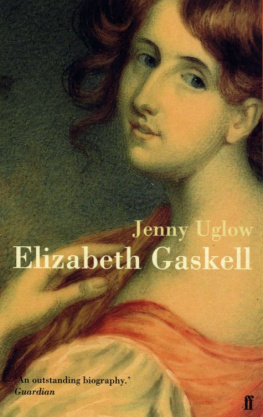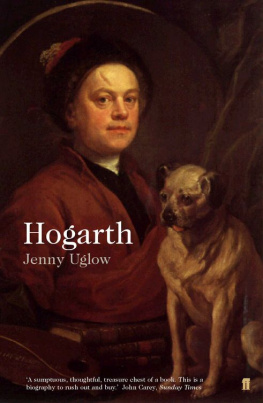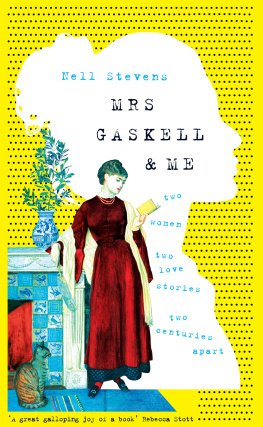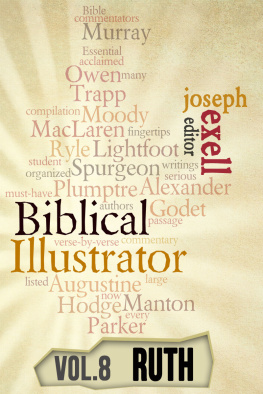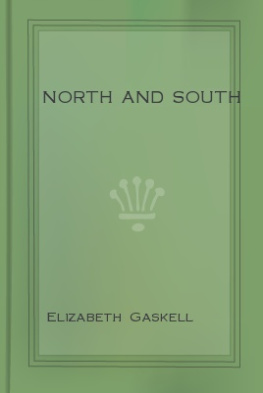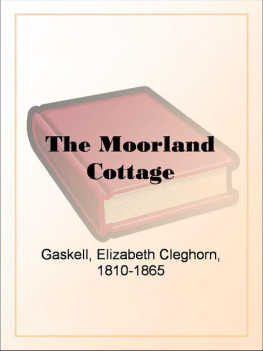Elizabeth Gaskell revised her work for new editions as well as for the transfer from periodical to volume publication. For consistency, I have quoted throughout from the only complete edition of the fiction, the Knutsford edition of TheWorksofMrsGaskell, ed. A. W. Ward, 8 vols (London, 1906), and for TheLifeofCharlotteBront I have used the Penguin Classics edition, ed. Alan Shelston (Harmondsworth, 1975). To allow easy reference to other editions, references are to chapters rather than page numbers.
Most of us still talk of Mrs Gaskell. That Mrs sounds so comfortable, fit for the author of Cranford. Yet Elizabeth Gaskells first novels, MaryBarton and Ruth, shocked Victorian readers: the blazon of matronly respectability set its face against controversy just as much as the male pseudonyms Currer Bell and George Eliot.
I had always admired Gaskells fiction and the vigour and humour of her letters. I liked the way she stood at odds with orthodoxies and eluded pigeon-holes. Conservatives and radicals, Christians and sceptics, Marxists and feminists, all acclaimed different aspects of her work, but all in the end seemed to tap their pens in frustration: she somehow did not fit. I wanted to trace her life, out of curiosity. But in reading her work I became increasingly intrigued by her notorious charm a word which, when applied to her writing, at once praises and diminishes, and partly explains why such an original, passionate and sometimes rather strange writer is so often taken for granted. Virginia Woolf read Gaskell while recovering from her breakdown in 1915; What a modest, capable woman, she wrote. Yet a fortnight later she grew impatient: what I object to in the mid Victorians is their instinctive fluency as if Mrs G. sat down to write with the cat on her knee. One knows what she meant. Gaskells fiction seems so easy; she is the quintessential mid-Victorian, constantly described as a born writer, a natural artist, an instinctive storyteller.
What do those phrases imply? That she was somehow gifted with a ventriloquist facility for telling other peoples tales? Up to a point this rings true she described her technique in MaryBarton as being to SEE the scenes I tried to describe, and then to relate them as if talking to a friend by the fire on a winter night. An intimate, oral, winters tale tradition certainly lies behind her work. She was, however, very conscious of her craft, aware of the limits of realism, alert to cultural traditions and linguistic history; she saw writing as hard work. Furthermore, hers is a fiction of ideas, acting out the dilemmas that preoccupied her time.
Gaskell herself said she could never express herself so well as through stories. It was because of this doubleness, the sense of something learnt so thoroughly that it comes to seem second nature, that I called this book A Habit of Stories. (Habits, of course, can be compulsive.) Then, because Elizabeth loved clothes, I found myself thinking of a habit as a garment, a feminine cloak, a dress for action like a riding-habit, a badge of vocation like a nuns. And since she grew up among women who incessantly explained the world through narrative in gossip, letters and folk-tales I began to see storytelling less as a habit than a habitat, subject to its own evolutionary laws. Our ways of reading, like Gaskells writing, have their roots in the mental landscapes of our age. But words from the past are still eloquent: we may accept the death of the author, but the habit of stories does not die.
*
This book was prompted by Will Sulkin, and I should like to thank him, and Stephen Gill, for encouraging me at the start. Since the publication of TheLettersofMrsGaskell in 1966 the principal debt of anyone exploring Gaskells life must be to the editors of that collection, J. A. V. Chapple and Arthur Pollard. I owe a special debt to John Chapple, who has generously shared his research, sent transcripts, told me of new discoveries, answered queries and read my text his patience and joviality never seem to flag. Joan Leach, knowledgeable local historian and tireless secretary of the Gaskell Society, has been invaluable in showing me Knutsford and in supplying details of Cheshire history. John Geoffrey Sharps has been a great support: his book MrsGaskellsObservationandInvention, with its spreading, meticulous notes, is a hoard of information, and he has also kindly allowed me to use his private collection of letters. Others working in this field have provided assistance or inspired ideas, particularly Barbara Brill (with her work on William Gaskell and her study of the Portico Library Archives), Angus Easson, John Gross, John Hodgson, Gunnel Melcher, Alan Shelston, Arthur Pollard, R. W. Webb and Patsy Stoneman.
I am grateful, too, to the following people: Rosemary Ashton and Kenneth Fielding for clarifying details about G. H. Lewes and the Carlyles; Hugh Cunningham, David Kynaston and David Turley for specific historical background; Andrew Motion for comments on early work; Janet Allen, formerly of the Portico Library, Manchester, for her warm hospitality and assistance with picture research; Deborah Rogers for practical and moral support; Jane Turner for her sustained interest; Susanne McDadd, Ron Costley, Helen Jeffrey and my witty, supportive editor, Julian Loose, for seeing the work to press; and Steve, Tom, Hannah, Jamie and Luke Uglow for being themselves. And finally for reading everything, in bits and pieces and bundles, and for making me think things through I especially want to thank my friends Hermione Lee, and Francis Spufford.
*
Mrs R. Trevor Dabbs has very kindly given permission to quote from the Gaskell familys unpublished correspondence and to reproduce portraits in her possession. I am also grateful to J. A. V. Chapple, Arthur Pollard and Manchester University Press for quotations from TheLettersofMrsGaskell, and to Oxford University Press for quotations from TheLettersofCharlesDickens (Pilgrim edition). I owe thanks to many librarians, notably Dr lain Brown of the Department of Manuscripts, National Library of Scotland, Christine Lingard of Manchester Central Library, Kate Perry of Girton College Library, Martin Phillips of the University of Keele, Jennie Rathbun of the Houghton Reading Room, Harvard, and Dr C. J. Sheppard of the Brotherton Special Collection, University of Leeds. I am also most grateful for the generous help of many members of the library staff at the University of Kent.
The following institutions and individuals have allowed me to use, quote from or reproduce material in their possession or in which they own the copyright: Birmingham University Library (Martineau Collection); the Bodleian Library, Oxford; University of California, Los Angeles; Christchurch College Library, Canterbury; Cambridge University Library; Columbia University Library, New York; Cornell University Library, Ithaca; the Mistress and Fellows, Girton College, Cambridge; the Houghton Library, Harvard University; the Huntington Library, San Marino, California; the late Dr R. R. Jamison; the John Rylands University Library of Manchester; Keele University Library for the WedgwoodMosley Collection, by courtesy of the Trustees of the Wedgwood Museum, Barlaston, Stoke-on-Trent, Staffordshire; Knutsford Public Library; the Brotherton Special Collection, University of Leeds; Mrs Susan Lowndes Marques; Manchester Central Reference Library; the New York Public Library (Berg Collection); New York University Libraries (Fales Collection); Nottingham Public Library; the Pierpont Morgan Library, New York; the Morris L. Parrish Collection, Princeton University Library; Mr J. G. Sharps; Royal Holloway and Bedford New College Archives (Reid Papers); Rutgers University Library, New Jersey; the National Library of Scotland; the Shakespeare Birthplace Trust, Stratford-upon-Avon; Michael Silverman; Smith College Library (Sophia Smith Collection); and Yale University Library.

